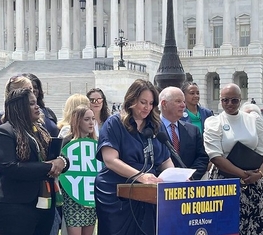303 Creative LLC v. Elenis
Case Summary
Lorie Smith, an owner of a graphic design firm planning to expand her business to include wedding websites, challenged the Colorado Anti-Discrimination Act (CADA) on the grounds it was overbroad and vague and violated her free exercise and speech rights under the First Amendment. Ms. Smith, who believes same-sex marriage contravenes her faith, alleged the CADA violated these rights because it forbade a public business from communicating to patrons that service would be refused based on sexual orientation.
Colorado’s Anti-Discrimination Act (CADA) forbids public accommodations, defined as “any place of business engaged in any sales to the public and any place offering services, facilities, privileges, advantages, or accommodations to the public,” from refusing services based on sexual orientation. This clause is known as the Accommodation Clause. CADA also forbids public accommodations from, “directly or indirectly...publish[ing]...any...communication...that indicates that the full and equal enjoyment of the goods, services, facilities, privileges, advantages, or accommodations of a place of public accommodation will be refused...or that an individual’s patronage...is unwelcome, objectionable, unacceptable, or undesirable because of...sexual orientation.” This section is known as the Communication Clause.
Lorie Smith is the owner of 303 Creative LLC, a graphic and web design company located in Colorado. Ms. Smith planned to expand her business by creating wedding websites. She represented that she was willing to work with people of all sexual orientations. However, Ms. Smith believes that same-sex marriage contradicts God’s will and refused to create any website celebrating same-sex marriages. Ms. Smith also planned to include on her website a statement announcing this refusal and the religious beliefs underpinning it. Before the case commenced, she had not created any wedding websites or posted the above statement out of concern she would violate CADA, which carries civil penalties and fines for violation. Ms. Smith brought a pre-enforcement action against CADA in the United States District Court for the District of Colorado, alleging the law was overbroad and vague under the Fourteenth Amendment and violated the Free Exercise and Free Speech Clauses of the First Amendment.
The District Court ruled that the plaintiff only had standing to contest the Communications Clause and granted summary judgment to the defendants. Ms. Smith appealed to the Tenth Circuit Court of Appeals, which affirmed the lower court’s ruling.
Ms. Smith then appealed to the US Supreme Court. The League of Women Voters of the United States joined an amicus brief led by the National Women’s Law Center supporting Colorado’s law. The brief called on the Court to uphold the Accommodations and Communications Clauses of Colorado’s Anti-Discrimination Act and not create exceptions to public accommodations laws based upon the First Amendment. Doing so, our brief argues, would undermine the structure of public accommodations laws, which are vital in protecting women, LGBTQIA+ people, and other historically disenfranchised communities.
To read more about this decision and how it could affect LGBTQIA+ Americans in real life, click here.
LWV Timeline
Plaintiff files Complaint
Plaintiff Lorie Smith, owner of 303 Creative, LLC files a lawsuit against the state of Colorado, alleging CADA was overbroad and vague under the Fourteenth Amendment, and violated the Free Exercise and Free Speech Clauses of the First Amendment.
District Court grants summary judgment to Colorado
The District Court grants summary judgment to the defendants. The court permits the plaintiffs to refile their Motions for a Preliminary Injunction and Summary Judgment once the Supreme Court rules in Masterpiece Cakeshop, Ltd. v. Colorado Civil Rights Commission, a case challenging CADA under First Amendment.
The District Court denies plaintiff's renewed motions for relief
After the Supreme Court's ruling, the plaintiffs file renewed Motions for a Preliminary Injunction and Summary Judgment. The District Court denied the motions, finding the Communication Clause at issue was valid under the First and Fourteenth Amendments.
Tenth Circuit Court of Appeals affirms district court’s ruling
The Tenth Circuit Court of Appeals affirms the district court’s ruling, finding CADA was valid and the district court’s grant of summary judgment for Colorado was not erroneous.
Plaintiff petitions for a writ of certiorari from the US Supreme Court
US Supreme Court partially grants the petition for certiorari
The US Supreme Court partially grants the plaintiff’s petition for a writ of certiorari, stating it would only decide whether CADA violated the First Amendment’s Free Exercise and Free Speech clauses.
League files amicus brief with NWLC
The League of Women Voters of the United States joins an amicus brief led by the National Women’s Law Center calling on the Supreme Court to uphold Colorado’s Anti-Discrimination Act.
Supreme Court issues opinion
In a 6-3 opinion, the United States Supreme Court rules that the plaintiff may refuse to create wedding websites for same-sex couples, holding that requiring her to do so under CADA would violate her free speech rights under the First Amendment.





